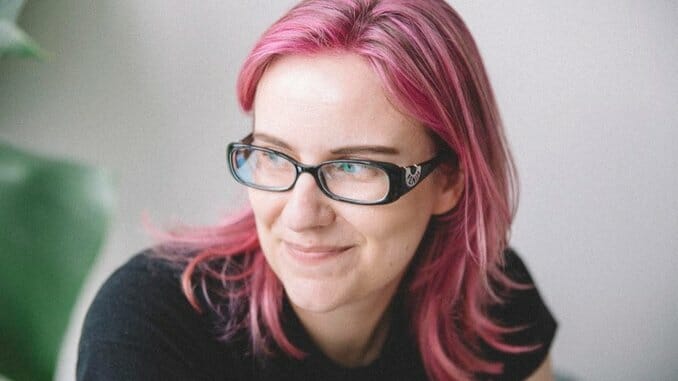Sarah Kurchak Reflects on Her New Memoir, I Overcame My Autism and All I Got Was This Lousy Anxiety Disorder
Photo by Jenna Marie Wakani
Sarah Kurchak spent nearly the entirety of three months in 2019 writing, and worrying about, her manuscript for her new book, to the point where she became physically ill. That was all going to be worth it, however, after the book launched, when she would celebrate with her mother in Las Vegas and attend book launches.
Then 2020 happened.
“It was incredibly tight and terrible and I would never recommend it to another soul,” Kurchak says. “And apparently I could have just spent a year writing it instead.”
Pandemic or not, Kurchak is now the author of I Overcame My Autism and All I Got Was This Lousy Anxiety Disorder. The memoir examines various stages of her life full of personal stories and anecdotes about how being on the autism spectrum affects her perspective of the world, and the world’s perspective of her.
Like many people with autism, it would be hard to guess Kurchak was on the spectrum at a glance. She’s able to speak and doesn’t need much support to get through day-to-day life, as some other people with autism do. Her most visible form of “stimming,” a behavior of repetitive movements or sounds sometimes associated with autism, is casually twirling her hair. But as is the case for many people with autism, that’s not to say it hasn’t had a profound effect on her life and those around her.
Kurchak writes that she had felt alienated from her peers since childhood, and had suspected that she was autistic since her early twenties. However, with no means of easily paying the pricey fee for a post-childhood diagnosis, it took a crisis to push her to finally get diagnosed at 27.
Since then, Kurchak had written about autism for a few years, becoming increasingly frustrated with there seeming to only be space for the most surface-level conversations around the subject. In response, she wrote what was supposed to be her final essay concerning autism, reflecting on these frustrations.
Soon after, an agent reached out to her with an offer to write an entire book on the subject. Kurchak accepted.
“Sarah had announced to us in Grade 1 that she was going to be a writer!” Jane Kurchak, Sarah’s mother, wrote in an email. When her daughter told her she was about to be a published author, she was “happy, proud and grateful but not surprised.”
While Kurchak hunkered down to write the book’s manuscript, she spent the majority of those three months at her home office at the time, in a narrow room with just enough space for her desk to fit. The desk is mostly clear, with only her Macbook, a few pens and sticky notes. Above it, however, is an extensive collection of keychains, figurines, a lunchbox, and drawings.
On one of the walls to the side of her desk hangs a poster with large, flashy letters: “REAL WOMEN. REAL FIGHTS. PILLOW FIGHT LEAGUE: FIGHT LIKE A GIRL.”
-

-

-

-

-

-

-

-

-

-

-

-

-

-

-

-

-

-

-

-

-

-

-

-

-

-

-

-

-

-

-

-

-

-

-

-

-

-

-

-








































